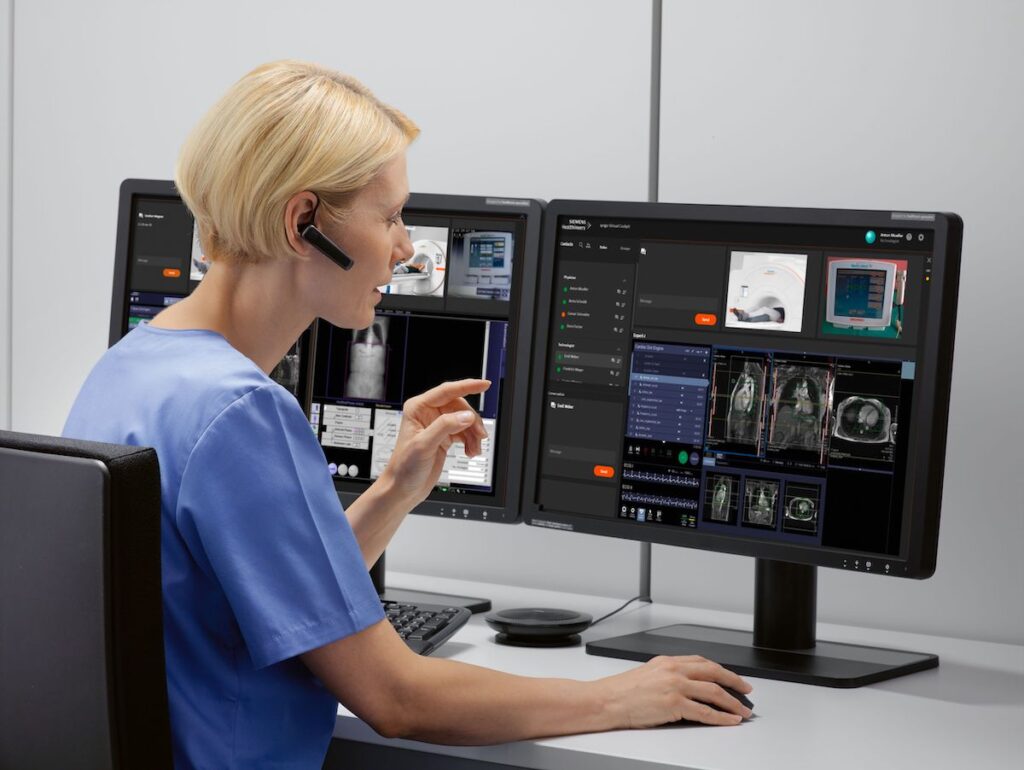The pace of development in new and enhanced medical technologies will only accelerate in the future as part of a wider acceleration in technology trends such as robotics, AI and new forms of embedded and connected sensors.
These technologies will enable new capabilities in diagnostics, scanning, monitoring and decision support. Technologies at the forefront of areas such as robotic surgery and scanning will push back the frontiers of what is possible today to enable expert practitioners to open up new possibilities to improve care.
These developments will require the training and supervision of junior clinical staff as they learn to use these new, more sophisticated devices.
Creating virtual supervision and remote learning opportunities enables specialists to support the wider use of these capabilities, by removing the need to be physically present during medical procedures thereby offering greater flexibility, capacity and efficiencies. This case study shows how this novel approach is being introduced into the design of next-generation scanning solutions.
The challenge
MRI scans are routinely used in the diagnosis and treatment of a wide range of medical problems where examining organs and soft tissues of the body is required. MRI scanners are sophisticated and expensive pieces of equipment requiring a radiographer trained to use an MRI scanner to undertake imaging investigations. Many MRI scans will be of a routine nature, while others require more expertise and patient support. Specialist, experienced Radiographers are therefore needed to provide guidance and support for more complex procedures.
At Frimley Park Hospital, InHealth has three MRI scanners across its site with experienced radiographers supporting and supervising their less experienced colleagues across these three on site locations. This support requirement could result in bottlenecks, due to the requirement to move between different locations.
Similarly, GenesisCare specialises in cancer treatment with multiple sites in the UK with MRI scanners. They have a Superintendent who needs to travel 40 miles between sites to oversee scans, also creating bottlenecks and constraints on the types and timing of certain scans.
The solution
syngo Virtual Cockpit is a software solution from Siemens Healthineers that is designed to assist the sharing of knowledge and management of scanning procedures from a distance. Expert colleagues are given access to the workstations on a number of scanners, within the same network, and they can provide timely over-the shoulder or live coaching support to staff as required, without having to be physically on site.
Using this technology, remote radiographers from both InHealth and GenesisCare can now virtually connect with their on-site radiographers in real time, through headsets, conference speakers or chat to discuss current cases. Through in-room cameras and workstations, images of patients, injectors and the workflow can be seen by experts to enable them to seamlessly provide verbal guidance or take control of the scanner via Siemens Healthineers’ syngo Expert-i software.
The outcome
- Delivery of remote scanning assistance allowing the rapid transfer of specialist knowledge between MRI scanners – leading to an improvement in access to clinical experts, improved efficiency and enhanced patient experience. There is also the potential to adjust staffing models and significantly reduce staff costs, both from a salary and travel/expenses perspective.
- Complex procedures: remote support for routine examinations, as well as rare and challenging examinations.
- Training of new and less-experienced radiographers can be conducted in less time through hands-on or remote, high-quality training. Potential to reduce onboarding of staff from 90 days to 30 days due to remote access to the scanner. This will also assist with the clinical assessment aspect of the annual appraisal process.
- Reduced travel time improves efficiency: the ability for radiographers from other sites to remotely assist staff on site. GenesisCare expects to make annual savings in travel costs of £4,000 per year.
- Bottleneck management: ability of remote scanning by an expert off site when on site staff are under pressure (due to holiday, illness or nightshifts). This alleviates the pressures of staff shortages to ultimately help increase patient satisfaction.
- Protocol management: the MR lead can now access all three scanners simultaneously and manage protocols. This is more efficient and leads to improved workforce productivity, reducing the time it takes to walk from one scanner to the next, and requires fewer phone calls.
Looking to the longer-term future
The option to provide remote virtual support for the delivery of supervised training and guidance for complex procedures opens up many possibilities for the future of scanning in the UK.
This model could be extended beyond organisational boundaries to provide virtual support services across a wider ICS or national geography. The ability to undertake remote guidance and supervision opens the door to a much greater set of possibilities across other specialities and care settings in the future.
This case study was written by the Public Policy Projects and published in the Digitalisation of Healthcare and Medical Technologies State of the Nation report which can be accessed at
